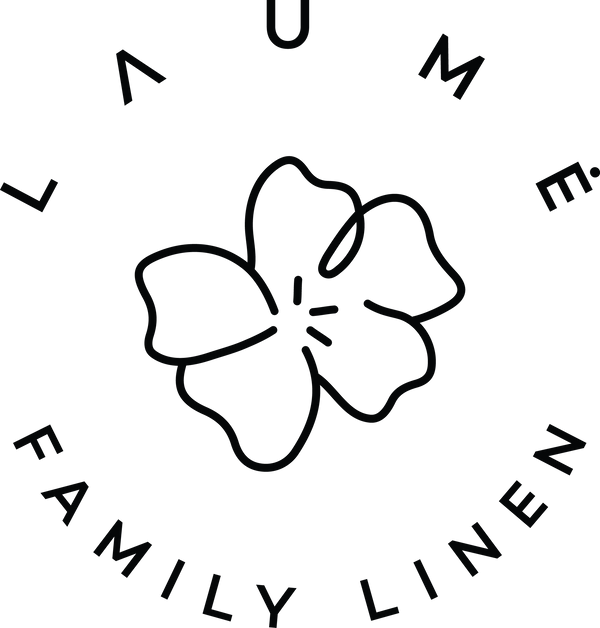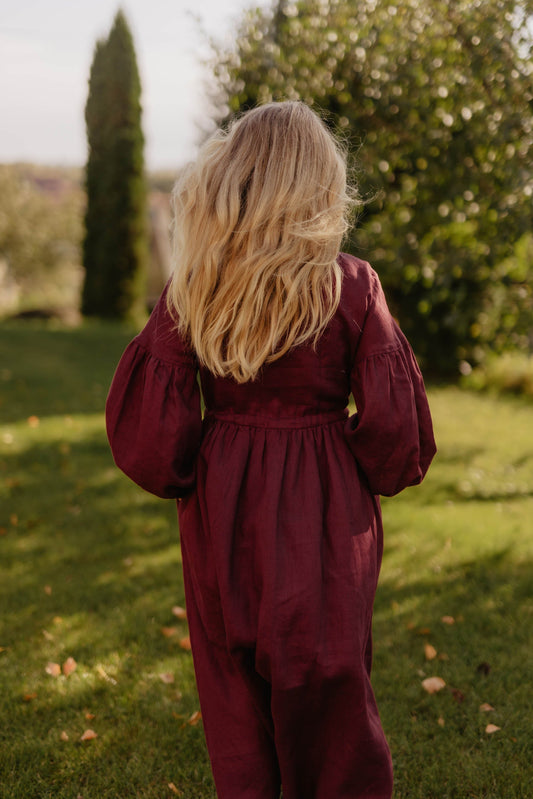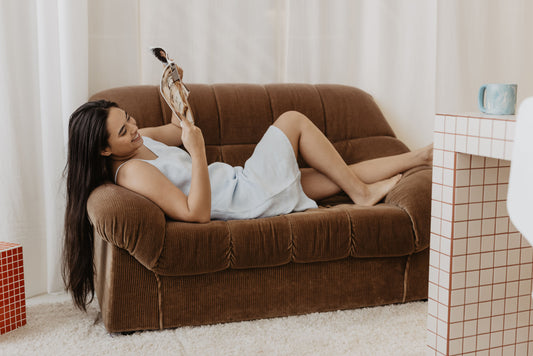
Why You Should Switch to Linen and Slow Fashion Today
Share
What is slow fashion?
Slow fashion is an approach to clothing that prioritizes quality, sustainability, and ethical practices over quantity and trend-chasing. It's about buying fewer, better-made pieces that you'll love for years to come, while supporting brands that respect the environment and workers' rights.
Slow fashion sustainability efforts
Slow fashion emerged as a reaction to the fast fashion industry, which is notorious for exploiting workers, polluting the environment, and creating a lot of waste. Slow fashion aims to slow down the pace of fashion and create a more mindful and responsible industry that respects the natural resources, the workers, and the consumers.
At Laumė linen, we stand by these principles and do our part. You can learn about our sustainability efforts here.
Fast fashion vs Slow fashion
Fast fashion and Slow fashion are two contrasting concepts that reflect different values and goals in the fashion industry. Here are some of the main differences between them:
|
Fast fashion |
Slow fashion |
|
Produces many collections per year based on the latest trends |
Produces fewer collections per year based on timeless designs |
|
Uses cheap and synthetic materials that are harmful to the environment |
Uses organic, recycled, or natural materials that are eco-friendly |
|
Uses chemical or toxic dyes that pollute the water and the soil |
Uses natural or low-impact dyes that are safe for the environment |
|
Uses mass production methods that are standardized and mechanized |
Uses artisanal or handmade methods that are unique and creative |
|
Exploits workers by paying low wages and providing poor working conditions |
Empowers workers by paying fair wages and providing decent working conditions |
|
Ships products globally using fossil fuels that emit greenhouse gases |
Ships products locally or regionally using renewable energy sources |
|
Hides or obscures information about its supply chain and practices |
Shares or discloses information about its supply chain and practices |
|
Encourages overconsumption and disposability of clothes |
Encourages mindful consumption and longevity of clothes |
Sustainable fashion
Sustainable fashion is a broad term that encompasses various approaches to reducing the environmental impact of the fashion industry. It is often used interchangeably with slow fashion, but it can also include other aspects such as:
- Innovation: Developing new technologies, materials, processes, or business models that can improve the sustainability performance of the fashion industry. For example, using biotechnology to create bio-based fabrics or using blockchain to create digital identities for garments in other words NFT.
- Collaboration: Working together with different stakeholders such as suppliers, manufacturers, retailers, consumers, NGOs, governments, or academia to find solutions to common challenges or opportunities in the fashion industry. For example, creating multi-stakeholder platforms or initiatives to address issues such as climate change, human rights, or circular economy.
- Advocacy: Raising awareness and influencing policy or behavior change among different actors in the fashion industry. For example, campaigning for stricter regulations or standards on environmental or social issues, or educating consumers about their role and responsibility in creating a more sustainable fashion system.

Ethical fashion
Ethical fashion is a term that focuses on the social impact of the fashion industry. It is closely related to slow fashion, but it emphasizes more on the human rights and animal welfare aspects of fashion production and consumption. Ethical fashion aims to ensure that:
- Workers are treated with dignity and respect, receive fair wages and benefits, have safe and healthy working conditions, have freedom of association and collective bargaining rights, have access to grievance mechanisms and remedies, and are not subjected to any form of discrimination, harassment, abuse, or exploitation. Read about our social commitment at Laumė linen.
- Animals are treated with compassion and care, are not harmed or killed for their fur, leather, wool, silk, or feathers, are not subjected to any form of cruelty or suffering such as mutilation, confinement, or testing.
- Consumers are informed and empowered to make ethical choices that reflect their values and beliefs. They are able to access reliable information about the origin and impact of their clothes. They are able to support brands and organizations that align with their ethical principles.
Slow fashion movement
Slow fashion movement is a collective term that describes the people and organizations who are involved in or support slow fashion. It is a grassroots movement that emerged from the dissatisfaction and frustration with the fast fashion industry and its negative impacts on the environment, society, and culture. It is a movement that challenges the status quo and advocates for change in the fashion system.
The slow fashion movement has various goals such as:
- To reduce the environmental footprint of the fashion industry by minimizing waste, pollution, resource consumption, and greenhouse gas emissions.
- To improve the social conditions of the fashion industry by ensuring fair trade, human rights, labor rights, animal rights, and gender equality.
- To enhance the cultural diversity of the fashion industry by preserving traditional crafts, skills, and heritage, and promoting local identity, creativity, and expression.
- To transform the consumer behavior of the fashion industry by encouraging mindful consumption, conscious choice, personal style, and emotional attachment.
The slow fashion movement has various strategies such as:
- To educate and inform consumers about the impacts of their fashion choices and the alternatives available to them.
- To influence and pressure brands and retailers to adopt more sustainable and ethical practices and policies in their production and distribution processes.
- To collaborate and cooperate with other stakeholders such as suppliers, manufacturers, NGOs, governments, or media to create synergies and solutions for common challenges or opportunities in the fashion industry.
- To innovate and experiment with new technologies, materials, processes, or business models that can improve the sustainability performance of the fashion industry.
Slow fashion week
Slow fashion week is a global event that celebrates and promotes slow fashion as a way to create a more sustainable and ethical fashion industry. It is organized by various groups and individuals who share a common vision and mission to raise awareness and inspire action for slow fashion. It usually takes place in September or October, coinciding with the traditional fashion weeks in major cities.
Slow fashion week consists of various activities such as:
- Fashion shows: Showcasing slow fashion brands and designers who create clothes that are beautiful, durable, and responsible. They often feature models of different sizes, shapes, ages, genders, and backgrounds to reflect the diversity and inclusivity of slow fashion.
- Workshops: Offering practical skills and knowledge on how to adopt slow fashion practices such as sewing, mending, upcycling, or dyeing clothes. They often involve hands-on learning and creative expression.
- Talks: Providing insights and perspectives on various topics related to slow fashion such as environmental issues, social issues, cultural issues, or personal stories. They often involve experts, activists, influencers, or storytellers who share their experiences and opinions.
- Events: Creating opportunities for networking and community building among slow fashion enthusiasts, supporters, or practitioners. They often involve social gatherings, parties, markets, or exhibitions that showcase slow fashion products, services, or initiatives.

How Linen fits into slow fashion
Linen is a fabric that has a low environmental impact and a high durability. Here are some of the reasons why linen is eco-friendly and long-lasting:
- Linen requires less water, pesticides, and fertilizers than other fabrics. Flax plants can grow in poor soil and harsh climates, and they use 60% less water than cotton. Flax plants also enrich the soil with nutrients and prevent erosion.
- Linen is biodegradable and recyclable. Linen can decompose naturally in the soil without leaving any harmful residues. Linen can also be recycled into new products or used as raw material for other industries.
- Linen is durable and resistant. Linen is one of the strongest natural fibers, and it becomes softer and more comfortable with each wash. Linen can withstand high temperatures, abrasion, and moths. Linen can last for decades if properly cared for.
By choosing linen, you can reduce your environmental footprint and extend the life span of your clothes. Learn more about how linen is made.

How Laumė linen creates hand-made linen clothing and accessories
At Laumė Linen, a small family business, we understand the essence of slow living. Our story is one of passion and vision. We source our linen from ethical and organic suppliers, ensuring that every thread is a step towards a better world. Our commitment to quality craftsmanship is reflected in each product we create.
Our design process is a labor of love, where attention to detail is paramount. Every piece is thoughtfully crafted with care, bearing in mind the comfort and style of the wearer. We don’t just make clothes; we create enduring pieces that become part of your life’s journey.
Our products are not mass-produced; each item is a unique work of art. We take pride in our small-scale production, which allows us to focus on quality and longevity. By choosing Laumė linen, you’re not just getting a garment; you’re investing in a piece that will last.
We also care about the social impact of our business. We respect and support the people who make our products, from the farmers who grow the flax to the artisans who sew and hand make the linen into the products you see. We pay fair wages and provide safe and healthy working conditions for our workers. We also support local communities and initiatives that promote slow fashion and ethical fashion.
We believe that slow fashion is not just a trend; it’s a movement. A movement that challenges the fast fashion industry and its negative consequences on the environment, society, and culture. A movement that values quality over quantity, durability over disposability, and timeless over trendy styles. A movement that celebrates diversity, creativity, and expression.
We invite you to join us in this movement and discover the beauty and benefits of linen- browse our new linen collections.



